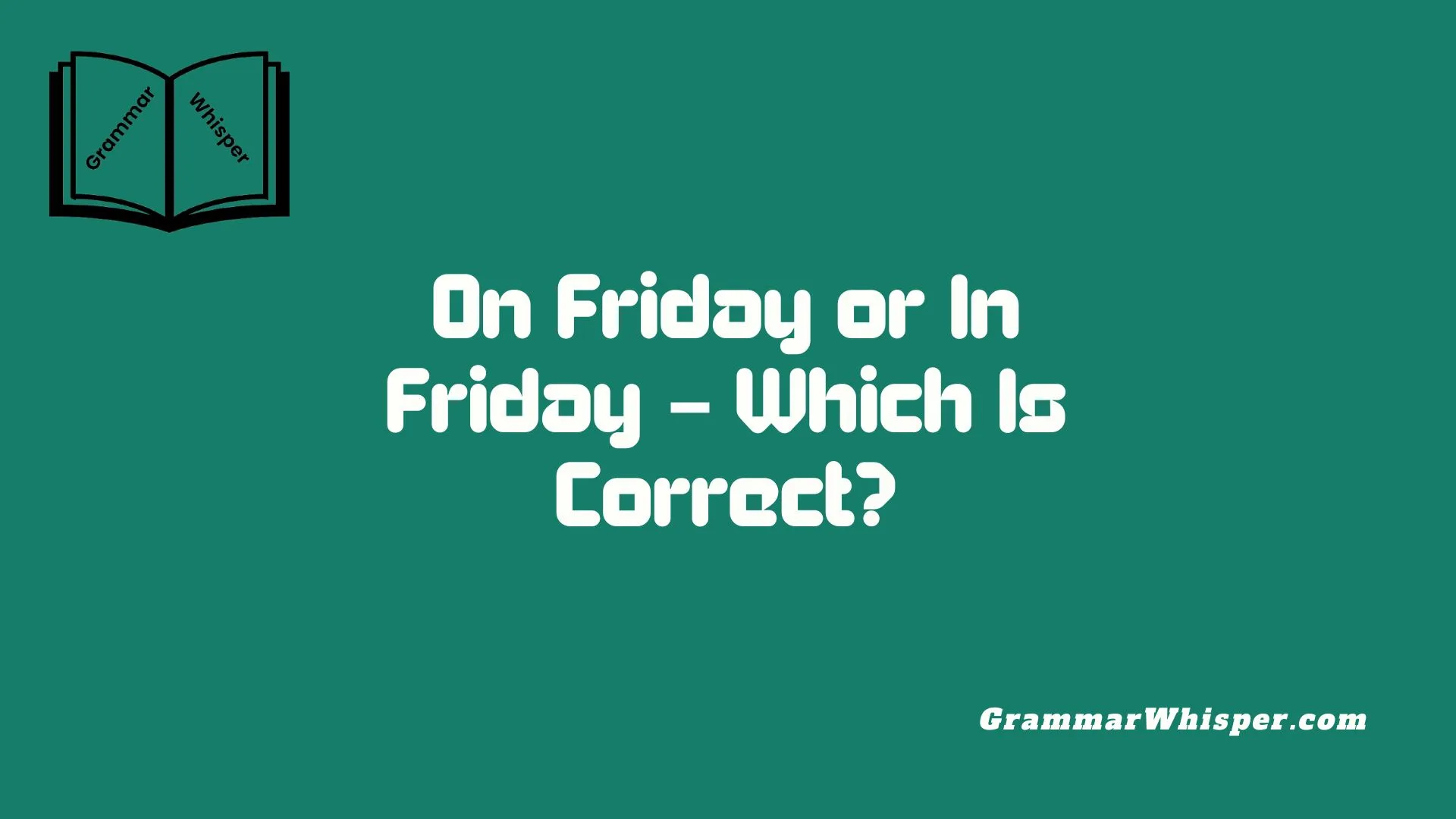When students ask me if it’s better to say “On Friday or In Friday” I know they’re grappling with one of those subtle but significantly important choices in English. At first, it might look like a minor difference, but the correct use of prepositions here makes your message feel more natural, especially to native speakers. In most real-life contexts, especially in written or spoken language, “on Friday” is both accurate and practical. It’s the standard usage when you’re referring to specific days of the week. Saying “in Friday” sounds off and doesn’t follow standard grammar.
As someone who works with content daily, I’ve noticed how picking the right phrases improves tone and clarity. In regional varieties like American English, “on Friday” is the go-to expression. It flows into the rhythm of real-world speech, giving your writing or speech a more authentic, relatable tone. Understanding how time-related expressions like this function gives you more confidence and makes your communication feel polished. It’s not just about sounding fluent – it’s about being understood clearly and naturally.
Understanding the Preposition “On” in Time-Related Contexts
In English, prepositions serve as connectors between words – especially to indicate relationships in time, place, and direction. When referencing specific days of the week, the standard preposition is “on.”
Example: “The meeting is on Friday.”
This usage isn’t arbitrary. It’s rooted in standard syntactic rules where:
- “On” is used for specific days/dates
- “In” is used for longer periods (months, years, decades)
- “At” is used for precise times
Time Prepositions Quick Table
| Time Expression | Correct Preposition | Example |
| Day of the week | on | on Friday, on Monday |
| Specific time | at | at 5 PM, at midnight |
| Month, Year, Decade | in | in July, in 1999, in the 80s |
| Holiday (day-specific) | on | on Christmas Day |
| Holiday (general) | at | at Christmas, at Easter |
This breakdown helps clarify why “on Friday” is the standard form.
Why “On Friday” Is Grammatically Correct
Grammatically, “on Friday” follows established rules in Standard American English and British English grammar systems. It identifies a specific point in the weekly cycle, which aligns with the grammatical role of the preposition “on”.
Supporting Grammar Authority:
- Chicago Manual of Style: endorses “on” before specific days
- APA Style Guide: uses “on Friday” in formal documents
- Cambridge Dictionary: defines “on” as the correct choice for days
This makes “on Friday” not just preferred but required in grammatically accurate contexts.
Real-World Examples of “On Friday” in Use
Let’s look at how “on Friday” appears in different communication formats:
- Business Email: “We’ll finalize the contract on Friday.”
- News Article: “The governor will address the public on Friday.”
- Social Media: “Catch our livestream on Friday at 6 PM!”
- TV Dialogue: “Didn’t we have plans on Friday?”
This shows that from formal reports to casual texting, “on Friday” is embedded deeply in real-world English.
The Grammar Error: Why “In Friday” Is Incorrect
The phrase “in Friday” is grammatically incorrect in standard English usage. Here’s why:
- “In” implies something enclosed or happening within a larger time period (e.g., “in April” or “in 2023”)
- A day of the week is too specific for “in” to logically apply
Incorrect Example:
❌ “I have a class in Friday.”
Corrected:
✅ “I have a class on Friday.”
Linguistic Reason: The preposition must match the time span, and “Friday” is too narrow for “in.”
Common Mistakes with Time Prepositions
Let’s explore where most English learners – and even native speakers – get tripped up.
Frequent Errors:
- “At Friday” instead of “on Friday”
- “In Monday morning” instead of “on Monday morning”
- “On 5 PM” instead of “at 5 PM”
Quick Fix Chart:
| Incorrect | Correct |
| at Friday | on Friday |
| in Monday morning | on Monday morning |
| on 5 PM | at 5 PM |
| in Christmas Day | on Christmas Day |
Understanding these patterns ensures you won’t make awkward or unclear statements.
When Prepositions Are Dropped in Spoken English
You’ll often hear native speakers say:
“I’ll see you Friday.”
This might seem like a grammar mistake, but it’s a stylistic choice. In spoken American English, especially in casual conversation, it’s common to drop “on” for brevity.
Examples:
- “We’re flying out Friday.”
- “The sale ends Friday night.”
Formal vs. Informal Context Table:
| Sentence | Register |
| “We’ll meet on Friday.” | Formal |
| “We’ll meet Friday.” | Informal |
Both are acceptable, but the latter fits more in speech than writing.
Understanding Prepositions by Language Context
Regional variations also play a role. In British English, “on Friday” is still correct, though some regional dialects occasionally omit it informally.
International Preposition Preferences:
| Region | Preferred Usage |
| United States | on Friday |
| United Kingdom | on Friday |
| Canada | on Friday |
| Australia | on Friday |
Meanwhile, “in Friday” doesn’t appear as a standard usage in any regional variation of English.
Visual Chart: Prepositions with Time Expressions
This diagram clearly shows when to use on, in, at, and how they apply to different time frames.
Avoiding Prepositional Confusion in Writing
Pro Writing Tips:
- Always ask: Is the time span broad (month/year) or specific (day/hour)?
- Use grammar-check tools: Grammarly, Hemingway, Microsoft Editor
- Read aloud to catch awkward preposition use
Sample Editing Checklist:
Avoid relying solely on instinct – practice builds precision.
Leveling Up: Using Time Prepositions in Advanced Writing
Beyond everyday usage, mastering time prepositions improves:
- Professional communication
- Narrative fluency
- Academic correctness
Examples:
- Formal: “The audit begins on Friday and concludes on Monday.”
- Narrative: “It happened on a quiet Friday afternoon.”
When you’re fluent with these nuances, your writing naturally elevates.
Consistency Across Days: Prepositions with Other Weekdays
Let’s apply “on” consistently across the entire week.
Weekday Usage Table:
| Day | Correct Phrase |
| Monday | on Monday |
| Tuesday | on Tuesday |
| Wednesday | on Wednesday |
| Thursday | on Thursday |
| Friday | on Friday |
| Saturday | on Saturday |
| Sunday | on Sunday |
This structure ensures your writing stays uniform and professional.
Key Takeaways for Everyday Communication
- Use “on” for days of the week: It’s the grammatically correct form.
- “In Friday” is never correct: Avoid this mistake completely.
- Prepositions may be dropped in casual speech, but not in formal writing.
- Understand the time span you’re referencing: short (use “on”), long (use “in”), precise (use “at”).
- Use editing tools and practice exercises to reinforce learning.
Final Thoughts
Mastering prepositions like “on” and avoiding errors like “in Friday” may seem like a small detail, but it reflects a deeper understanding of English fluency and grammatical accuracy. Whether you’re writing an email, crafting a social media post, or preparing for an English exam, using prepositions correctly helps you sound natural, credible, and professional.
Always remember: “On Friday” is the correct and standard form when referring to specific days. Avoid using “in Friday” in any formal or informal context. If you’re still unsure, immerse yourself in native-level content – read more, listen often, and speak regularly. With consistent exposure and practice, these small grammar rules become second nature.
Now let’s tackle some common questions people ask about this topic.
FAQs
What’s the difference between “on Friday” and “in Friday”?
“On Friday” refers to a specific day and is the grammatically correct preposition for time-related contexts. “In Friday” is incorrect in standard English. Use “on” when referencing exact days.
Can I drop the preposition and just say “Friday” in conversation?
Yes, in casual speech, especially American English, people often say, “See you Friday” instead of “See you on Friday.” It’s informal but widely accepted.
Are there similar preposition rules for other time expressions?
Absolutely. Use “on” for days, “in” for months or years (e.g., in July, in 2025), and “at” for specific times (e.g., at 3 p.m.). Each preposition has a specific time-related role.
Why is “in Friday” considered wrong?
Because the preposition “in” implies a broader time frame like months or years, it doesn’t match the precision of a specific day like Friday. That’s why “on Friday” is the correct form.
Is this rule the same in British and American English?
Yes, both American and British English use “on Friday.” While casual speech may vary, formal writing on both sides of the Atlantic adheres to the same grammatical rule.











